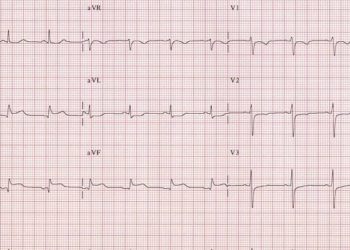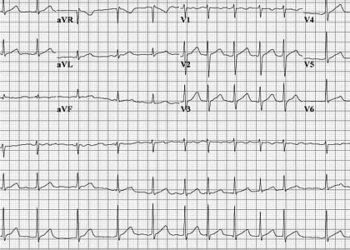Early rhythm control for atrial fibrillation reduces the risk of adverse cardiovascular events
1. Early rhythm control for atrial fibrillation (AF) was associated with a significantly reduced risk of an adverse cardiovascular event.
2. Early rhythm control for AF caused no significant risk increase for adverse safety outcomes.
Evidence Rating Level: 1 (Excellent)
Study Rundown: AF is associated with an increased risk of adverse cardiovascular events such as congestive heart failure as well as other diseases, including stroke. Rate control is integral to the management of AF, though rhythm control also helps to ameliorate symptoms and improve quality of life. Previous trials have demonstrated that rhythm control therapy was associated with a lower risk for adverse cardiovascular outcomes compared to usual care among patients diagnosed with AF in the previous year. However, there is a knowledge gap in understanding the association between early rhythm control and cardiovascular outcomes as stratified by the previous trial’s eligibility compared with rate control. This study found that the clinical benefit associated with early rhythm control and reducing cardiovascular outcomes were consistently observed in low-risk AF patients. This study was limited by factors such as not studying the burden of AF. There were also unmeasured confounders such as anticoagulation quality and lifestyle factors including obesity, alcohol intake, and physical activity. Nevertheless, the study findings are significant, as they demonstrate that early rhythm control in patients with AF provides a significant benefit in reducing the risk of adverse outcomes such as cardiovascular events or stroke.
Click to read the study in AIM
Relevant Reading: Effectiveness and Safety of Direct Oral Anticoagulants Versus Warfarin in Patients With Valvular Atrial Fibrillation
In-Depth [retrospective cohort study]: This population-based retrospective cohort study examined the nationwide claims database of the Korean National Health Insurance Service. Patients who were greater than 18 years old with AF who were treated with rhythm control or rate control between July 2011 and December 2015 were eligible for the study. Patients who died within 180 days of their first record of a prescription or procedure were excluded from the study. The primary outcome measured was a composite of death from cardiovascular causes, ischemic stroke, hospitalization due to heart failure, or acute myocardial infarction. Outcomes in the primary analysis were assessed via subgroup analyses with interaction tests and time-varying regression analyses. Based on the primary analysis, among the patients eligible for the initial trial, those who had received early rhythm control were associated with a lower risk for the primary composite outcome as compared to rate control (Hazard Ratio [HR] 0.86; 95% Confidence Interval [CI] 0.81 to 0.92). Among the low-risk patients who did not meet the inclusion criteria for the original trial, early rhythm control was also consistently associated with a lower risk for the primary composite outcome (HR 0.81, 95% CI 0.66 to 0.98). Additionally, no statistically significant differences were found in safety outcomes between the rhythm and rate control strategies. Overall, this study demonstrates that early rhythm control is associated with a significantly reduced risk of cardiovascular complications such as myocardial infarction or heart failure and risks of developing stroke.
Image: PD
©2022 2 Minute Medicine, Inc. All rights reserved. No works may be reproduced without expressed written consent from 2 Minute Medicine, Inc. Inquire about licensing here. No article should be construed as medical advice and is not intended as such by the authors or by 2 Minute Medicine, Inc.









